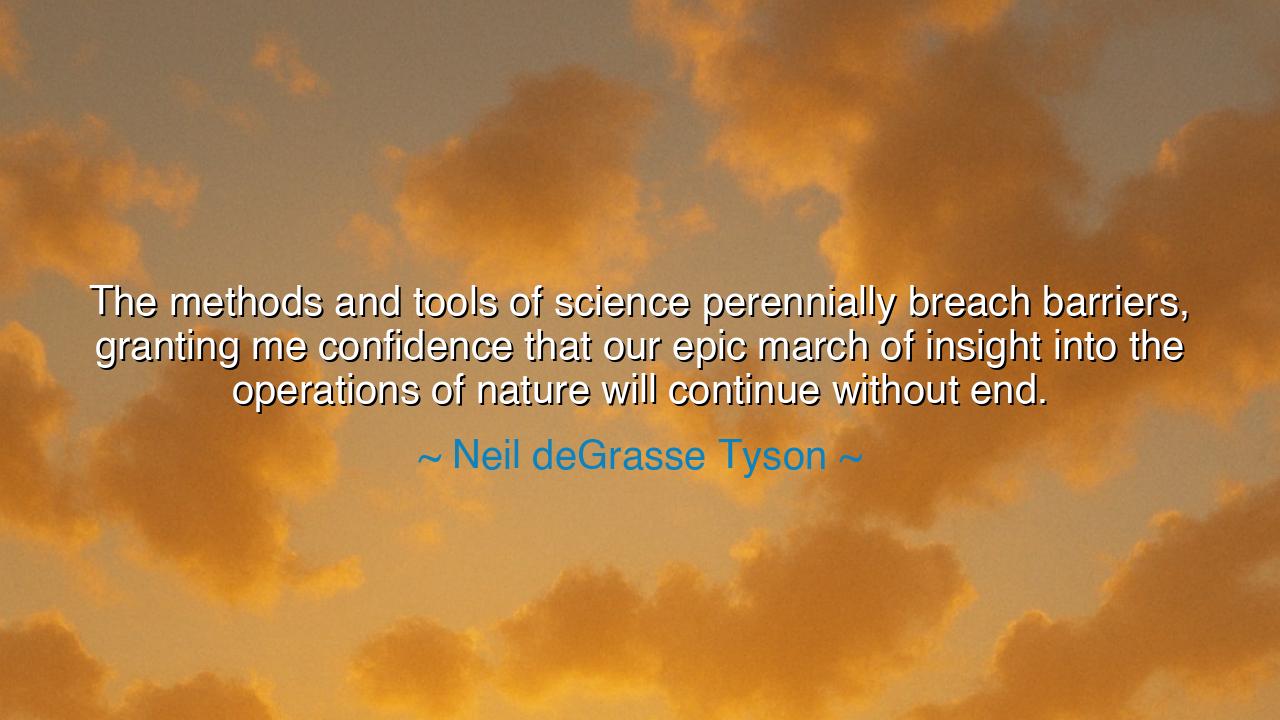
The methods and tools of science perennially breach barriers
The methods and tools of science perennially breach barriers, granting me confidence that our epic march of insight into the operations of nature will continue without end.






Hear, O Seekers of Knowledge, the words of Neil deGrasse Tyson, who speaks of the endless, ever-expanding journey of science—a journey that breaches barriers and unveils the mysteries of the universe with each new discovery. "The methods and tools of science perennially breach barriers, granting me confidence that our epic march of insight into the operations of nature will continue without end." In these words, Tyson speaks to the unrelenting force of science, a force that continually pushes back the walls of ignorance, revealing new realms of understanding. The tools and methods of science, he tells us, are not mere instruments of observation—they are the very means by which we overcome the limits of our knowledge and advance on the path of infinite discovery.
In the ancient world, the philosophers and early scientists also sought to breach the barriers of their time, to uncover the secrets of the world that lay beyond their understanding. Pythagoras, whose love of mathematics led him to discover the principles of geometry, is one such example. His methods—based on reason and observation—were revolutionary in a time when such ideas were considered radical. Through his insights into the nature of numbers and shapes, he helped to lay the foundation for the entire edifice of science. Just as Pythagoras’ methods and tools opened up a new way of seeing the world, so too does Tyson remind us that science—in all its forms—continually pushes the boundaries of knowledge, revealing ever more about the natural world.
The methods of science—the tools of reason, observation, and experiment—are not static; they evolve with each new discovery. Galileo Galilei, the great astronomer, demonstrated this evolution when he used the telescope to peer into the heavens and uncover the truths of the solar system. His methods, though groundbreaking, were only the beginning of a long march toward understanding. Galileo’s tools were simple compared to the instruments we use today, yet they allowed him to breach the barriers of his time, challenging the prevailing geocentric view of the universe. His discoveries opened up new worlds of thought and set humanity on the path to unraveling the vast mysteries of the cosmos.
Tyson’s confidence in the continued march of insight is rooted in the understanding that science is not a one-time endeavor but a perennial force, one that is constantly evolving. From the discovery of fire to the exploration of the DNA helix, from the invention of the wheel to the journey to the moon, the history of humanity is a history of science breaking down barriers, unlocking new realms of possibility. The epic march of insight that Tyson speaks of is a journey that has no end, a journey that will continue long after our time. The methods and tools of science, constantly refined and reimagined, ensure that this march will never falter, but will only accelerate as our understanding deepens.
Consider, O Seekers, the discovery of electricity by Benjamin Franklin. His experiment with a kite and a key in a thunderstorm was a moment of profound insight into the nature of electricity—a moment that revealed a new force of nature, hidden in the skies above. Franklin’s methods were simple by modern standards, but the question he asked, the insight he sought, set the stage for countless innovations that followed. Franklin’s discovery did not stop with the understanding of lightning; it laid the groundwork for the development of the electrical grid, telecommunication, and the computer revolution. Through his methods and tools, Franklin helped to breach the barrier between the mysterious and the knowable, forever changing the way we interact with the world around us.
The lesson, O Seekers, is clear: the tools of science—whether they be the simple telescope of Galileo or the advanced particle accelerators of today—are the means by which we break free from the limitations of our knowledge. Science is not a closed book, but an open journey, one that will continue for as long as humanity seeks to understand the nature of reality. As long as we ask questions, as long as we explore, the barriers will continue to fall, and new realms of knowledge will open before us. Each discovery is not an end, but a beginning—a step forward into a future where the boundaries of understanding are constantly redrawn.
So go forth, O Seekers, with the understanding that the pursuit of knowledge is an unending journey. Science is not merely a body of facts, but a living, breathing force that shapes the way we see the world and our place in it. Tyson’s confidence in the continued march of insight is a confidence we too should embrace. As long as we continue to question, to explore, and to experiment, the doors of knowledge will remain open, and the barriers will continue to fall. Let this understanding guide you in your own quest for knowledge, knowing that every step you take brings us all closer to the truth, and to the endless frontiers that await.






AAdministratorAdministrator
Welcome, honored guests. Please leave a comment, we will respond soon